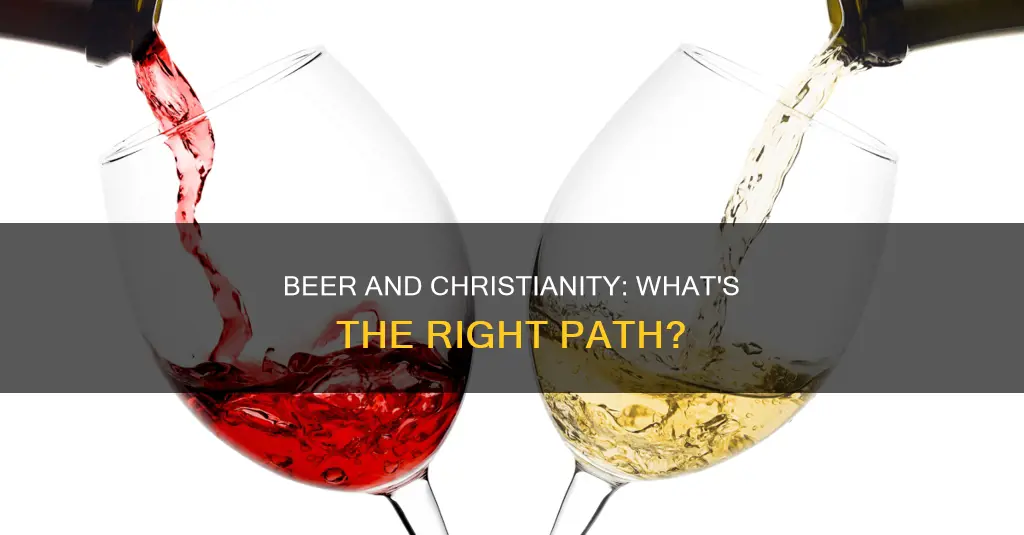
Drinking alcohol is a controversial topic among Christians, with some interpreting the Bible as forbidding it and others seeing no issue with moderate consumption. While Scripture does not explicitly prohibit Christians from drinking beer, wine, or other alcoholic beverages, it strongly condemns drunkenness and its negative consequences. The key question for Christians is whether drinking alcohol, in any quantity, is compatible with their faith and values.
| Characteristics | Values |
|---|---|
| Is drinking alcohol a sin? | No, it is not a sin to drink alcohol. Scripture does not forbid Christians from drinking beer, wine, or any other drink containing alcohol. |
| What does the Bible say about drinking alcohol? | Scripture has much to say regarding the drinking of alcohol. The Bible warns against excessive drinking and drunkenness, which can lead to sinful behaviour and poor judgment. |
| What is the key point from the scriptures? | The Bible warns against drunkenness because of its negative consequences. Drunkenness leads to a loss of self-control and indulgence in sinful behaviours, steering believers away from a life led by the Holy Spirit. |
| Is drinking in moderation condemned in the Bible? | Drinking alcohol in moderation is not condemned, but believers are encouraged to exercise self-control and avoid excess. |
| Is it a sin to cause another person to stumble into alcohol addiction? | Yes. Romans 14:20 says, "Do not destroy the work of God for the sake of food. All food is clean, but it is wrong for a man to eat anything that causes someone else to stumble." |
| What are the dangers of drunkenness? | Drunkenness can impair judgment and lower inhibitions, often leading to actions that one would not ordinarily consider, resulting in moral and legal consequences. It can also strain or destroy relationships and lead to addiction. |
What You'll Learn

Drunkenness is sinful
The Bible is clear in its warnings against drunkenness, emphasising both the moral and practical dangers associated with it. Drunkenness is listed among various acts of sinful nature in Galatians 5:19–21 (NIV):
> "The acts of the sinful nature are obvious: sexual immorality, impurity and debauchery; idolatry and witchcraft; hatred, discord, jealousy, fits of rage, selfish ambition, dissensions, factions and envy; drunkenness, orgies, and the like. I warn you, as I did before, that those who live like this will not inherit the kingdom of God."
This passage condemns habitual drunkenness as part of a lifestyle of sinful behaviour, indicating that it is incompatible with a life committed to following Christ. Drunkenness leads to a loss of self-control and can result in irresponsible behaviour, neglect of responsibilities, emotional harm to loved ones, and sinful actions that one would not ordinarily consider.
The Bible also highlights the negative physical health impacts of heavy drinking, including liver disease, heart problems, and other serious health conditions. It can also negatively impact mental health, contributing to depression, anxiety, and other psychological issues.
The dangers of drunkenness are further emphasised by the story of Noah, which is intended to serve as an example of the dangers and repulsiveness of intemperance. Additionally, the consequences of Lot's drunkenness demonstrate the potential for conflict and moral and legal consequences that can arise from excessive drinking.
The Bible provides clear instructions for Christians to avoid drunkenness, as seen in Ephesians 5:18: "Do not get drunk on wine, which leads to debauchery. Instead, be filled with the Spirit." This verse encourages believers to be filled with the Spirit rather than indulging in drunkenness, which can lead to sinful behaviour and poor judgment.
While Scripture does not forbid Christians from drinking beer, wine, or any other alcoholic beverage, it is essential to recognise that drunkenness and addiction to alcohol are sins that Christians must absolutely refrain from.
The Science of Nitro Beers: How Do They Work?
You may want to see also

Alcohol is a gift from God
Alcohol, when consumed in moderation, can be a blessing and is often depicted as such in the Bible. For instance, Psalm 104:14-15 states that God gives wine "that makes glad the heart of men". Ecclesiastes 9:7 instructs believers to "Drink your wine with a merry heart". Additionally, Amos 9:14 describes drinking wine from your own vineyard as a sign of God's blessing.
Alcohol was also used for medicinal purposes in biblical times. For example, 1 Timothy 5:23 advises Timothy to consume wine for his stomach issues. Similarly, Proverbs 31:61 recommends giving "strong drink to the one who is perishing, and wine to those in bitter distress".
Moreover, alcohol was a common and central part of daily life in biblical times. It was consumed at meals and used in sacrificial rituals and festal celebrations. Wine was also valued for its role in trade.
However, it is essential to approach alcohol with wisdom and caution. While drinking in moderation is not a sin, drunkenness is condemned in Scripture. Christians must be mindful not to allow their bodies to be "mastered" by anything, including alcohol (1 Corinthians 6:12; 2 Peter 2:19).
In conclusion, alcohol is a gift from God that can bring joy and blessing when used wisely. However, Christians must be cautious not to fall into the sin of drunkenness or addiction, as these can lead to destructive consequences.
Beer Before Bed: Friend or Foe to Anxiety?
You may want to see also

Alcohol abuse
The Bible provides clear warnings against drunkenness, emphasising both the moral and practical dangers associated with it. Ephesians 5:18 instructs believers to "not get drunk on wine, which leads to debauchery. Instead, be filled with the Spirit." Similarly, Galatians 5:19-21 lists "drunkenness" among sinful acts, warning that those who engage in such behaviour will not inherit the kingdom of God. These passages underscore the negative consequences of excessive drinking and the importance of self-control.
It is important to note that the alcoholic content of ancient beverages was significantly lower than modern drinks, and wine was often diluted with water. However, this does not negate the clear biblical message against drunkenness and alcohol abuse. Christians must be cautious and exercise self-control to avoid the pitfalls of excessive drinking and its destructive consequences.
Beer and Cholesterol: Is Your Drinking Habit Healthy?
You may want to see also

Alcohol in the Bible
Alcohol is referenced throughout the Bible, and its consumption is prescribed for religious rites and medicinal uses in some places. Wine is the most common alcoholic beverage mentioned in biblical literature, but the inhabitants of ancient Israel also drank beer and wines made from fruits other than grapes.
The Bible does not forbid Christians from drinking alcohol, and in some passages, alcohol is discussed in positive terms. Ecclesiastes 9:7 instructs: "Drink your wine with a merry heart", while Psalm 104:14-15 states that God gives wine "that gladdens the heart of men". In Isaiah 55:1, God encourages people to "buy wine and milk".
However, the Bible also warns against the dangers of alcohol abuse and drunkenness. Christians are commanded to avoid drunkenness (Ephesians 5:18) and not to allow their bodies to be "mastered" by anything (1 Corinthians 6:12; 2 Peter 2:19). Drunkenness is described as spiritually dangerous and is associated with negative consequences such as impaired judgment, strained relationships, and health risks.
Some Christians choose to abstain from alcohol completely to avoid the risks associated with excessive drinking and to respect the beliefs of others. Others consume alcohol in moderation, enjoying it as a blessing from God without becoming enslaved to it. Ultimately, the decision to drink or abstain is a personal choice guided by an individual's faith and values.
Pregnant Women and Alcohol: Is Cider Beer Safe?
You may want to see also

Alcohol in Christian history
Alcohol has played a significant role in Christian history, often serving as a source of debate and reflection on the role of faith in daily life. For over 1800 years, the regular use of wine in the celebration of the Eucharist and daily life was a common and undisputed practice in Christianity. This view held that alcohol was a gift from God, bringing merriment and joy to people's lives. However, excessive drinking leading to drunkenness was considered sinful and warned against in the Bible.
During the mid-19th century, some Protestant Christians shifted away from this position, advocating for abstentionism or prohibitionism. This change in perspective was driven by a growing concern about the negative consequences of alcohol abuse and a desire to promote temperance. Despite these shifts, the original position of permitting alcohol consumption remains the most common and dominant view among Christians worldwide today.
Notable Christian figures throughout history have had varying relationships with alcohol. For example, C.S. Lewis, a renowned theologian, and J.R.R. Tolkien would often discuss theology while enjoying a glass of ale in an English pub. Martin Luther, the father of the Protestant Reformation, was known for his wife's homemade beer, and John Calvin, a leader of the Reformation, received part of his salary in the form of wine.
The early Church Fathers, such as Clement of Alexandria and John Chrysostom, also weighed in on the topic. While they cautioned against drunkenness, they generally did not view alcohol as inherently evil. Instead, they emphasised the importance of moderation and self-control.
In conclusion, alcohol has been a part of Christian history for centuries, with perspectives ranging from moderation to abstention and prohibition. While excessive drinking is universally condemned, the consumption of alcohol in moderation is generally accepted by many Christian denominations today.
Beer Drinking: Daily Habit or Unhealthy Vice?
You may want to see also
Frequently asked questions
No, it is not a sin for Christians to drink beer, as there is no defining verse or passage in Scripture that states alcohol is intrinsically evil. However, the Bible warns against drunkenness and excessive drinking, which can lead to sinful behaviour and poor judgment.
The Bible does not forbid Christians from drinking beer, wine, or any alcoholic beverage. In fact, some passages discuss alcohol positively, such as Ecclesiastes 9:7, "Drink your wine with a merry heart". However, the Bible also contains verses that warn against drunkenness and its negative consequences, such as Ephesians 5:18, "Do not get drunk on wine, which leads to debauchery".
Yes, it is okay for Christians to drink non-alcoholic beer. Drinking alcoholic beverages is also not prohibited, as long as it is done in moderation and does not lead to drunkenness.
Christian views on alcohol vary, with some choosing abstentionism or prohibitionism, while others hold the original position that alcohol consumption in moderation is permissible. The key Christian belief is that drunkenness and addiction to alcohol are sins, as they can lead to negative consequences and impair one's spiritual well-being.







